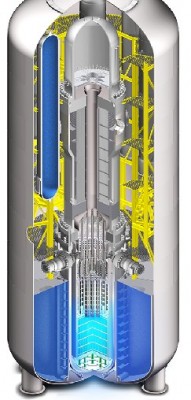
The US nuclear industry's hopes for a brighter, more profitable future, represented by the development of small modular reactors - the Easy Bake Ovens of nuclear energy - have suddenly dimmed. Unlike Hollywood's "If you build it they will come" fantasy-based business model, few if any SMR customers have even shown up.
So both Westinghouse and Babcock Wilcox, after already pumping $100's of millions into new designs, have had second thoughts about their chances of success in a new and untested market. After all, when the industry touted SMR's as a game-changer, the benefits of mass production - shorter factory build times, reduced shipping costs, and quicker installation - required a steady stream of orders to pan out.
In February, Danny Roderick, CEO of Westinghouse, announced that his firm was calling off R&D for their SMR, which is designed to produce 225 MWe, the high-end of the new market.
His decision came after two setbacks. In November 2012, competitor Babcock & Wilcox, along with minority partner Bechtel, won the first DOE R&D subsidy round for its proposed 180-megawatt reactor, mPower. Working with the Tennessee Valley Authority, Babcock and Wilcox has received $101 million from the energy department so far. Then last December, NuScale Power, its 45-mw reactor design backed by Fluor and Rolls-Royce, won the second round, grabbing $226 million.
Considering alternatives
At the time, the DOE stated that it would not fund construction, and none of the small reactor makers have announced construction funding commitments from private backers.
After being shut out twice, Westinghouse's partner
Ameren Missouri decided it was "stepping back and considering [its] alternatives." Another factor contributing to Ameren's step back, the state's Governor had sold the public on SMR's by promising jobs as Westinghouse built a new twenty-first century industry. No customers, no deal, no twenty-first century jobs.
Roderick explained that the lack of customers was a serious problem. "The worst thing to do is get ahead of the market." Roderick added that Westinghouse needed to make 30 to 50 small modular reactors to get a return on their investment. This, of course, is a number that would reflect heavy demand for the new reactor. So in the end, with no federal funding and no market, there was no way forward.
Ironically, Westinghouse will concentrate on its $1 billion a year decommissioning business - which is already as profitable as its AP000 reactor business. With the aging

global nuclear fleet, this promises to be a growth industry far into the future.
Slowing SMR development
Babcock and Wilcox may have won DOE funding, but it has already spent about $400 million of its own money on its 180-megawatt reactor. This has caused a major rethinking. CEO
Jim Ferland said the company will propose a new strategy for mPower in mid-April, which could even include cutting the project's budget down to a very low level to slow the SMR's development.
Agreeing with Roderick, Ferland said that the market for small reactors is further out than anticipated when the program started in 2009. The world has changed radically since then; utilities are putting off building new plants because demand for electricity remains weak, and may even flatten out in the future; and there is also the relentless competition from low-cost natural gas. (Don't forget much cheaper renewables, and lingering post Fukushima jitters.)
Ferland estimated (optimistically) the market for SMR's has been pushed back three to five years. What he may be thinking is that rapidly expanding third-world economies (probably the only realistic market, if they're still even pursing power grid extensions) need time to grow into a $1 billion dollar reactor.
Initially Babcock and Wilcox's plan A was to find other minority partners like Bechtel. But "investors that want to take even minority positions are hard to find." So now the company is seeking plan B, a majority owner, sweetening the deal by agreeing to sell the mPower intellectual property along with the majority share. But that strategy hasn't worked either, leaving severe budget cuts as the only workable alternative so far.
 The US nuclear industry's hopes for a brighter, more profitable future, represented by the development of small modular reactors - the Easy Bake Ovens of nuclear energy - have suddenly dimmed. Unlike Hollywood's "If you build it they will come" fantasy-based business model, few if any SMR customers have even shown up.
So both Westinghouse and Babcock Wilcox, after already pumping $100's of millions into new designs, have had second thoughts about their chances of success in a new and untested market. After all, when the industry touted SMR's as a game-changer, the benefits of mass production - shorter factory build times, reduced shipping costs, and quicker installation - required a steady stream of orders to pan out.
In February, Danny Roderick, CEO of Westinghouse, announced that his firm was calling off R&D for their SMR, which is designed to produce 225 MWe, the high-end of the new market.
His decision came after two setbacks. In November 2012, competitor Babcock & Wilcox, along with minority partner Bechtel, won the first DOE R&D subsidy round for its proposed 180-megawatt reactor, mPower. Working with the Tennessee Valley Authority, Babcock and Wilcox has received $101 million from the energy department so far. Then last December, NuScale Power, its 45-mw reactor design backed by Fluor and Rolls-Royce, won the second round, grabbing $226 million.
The US nuclear industry's hopes for a brighter, more profitable future, represented by the development of small modular reactors - the Easy Bake Ovens of nuclear energy - have suddenly dimmed. Unlike Hollywood's "If you build it they will come" fantasy-based business model, few if any SMR customers have even shown up.
So both Westinghouse and Babcock Wilcox, after already pumping $100's of millions into new designs, have had second thoughts about their chances of success in a new and untested market. After all, when the industry touted SMR's as a game-changer, the benefits of mass production - shorter factory build times, reduced shipping costs, and quicker installation - required a steady stream of orders to pan out.
In February, Danny Roderick, CEO of Westinghouse, announced that his firm was calling off R&D for their SMR, which is designed to produce 225 MWe, the high-end of the new market.
His decision came after two setbacks. In November 2012, competitor Babcock & Wilcox, along with minority partner Bechtel, won the first DOE R&D subsidy round for its proposed 180-megawatt reactor, mPower. Working with the Tennessee Valley Authority, Babcock and Wilcox has received $101 million from the energy department so far. Then last December, NuScale Power, its 45-mw reactor design backed by Fluor and Rolls-Royce, won the second round, grabbing $226 million.
 global nuclear fleet, this promises to be a growth industry far into the future.
global nuclear fleet, this promises to be a growth industry far into the future.








